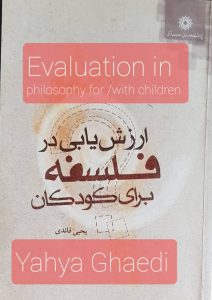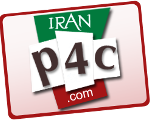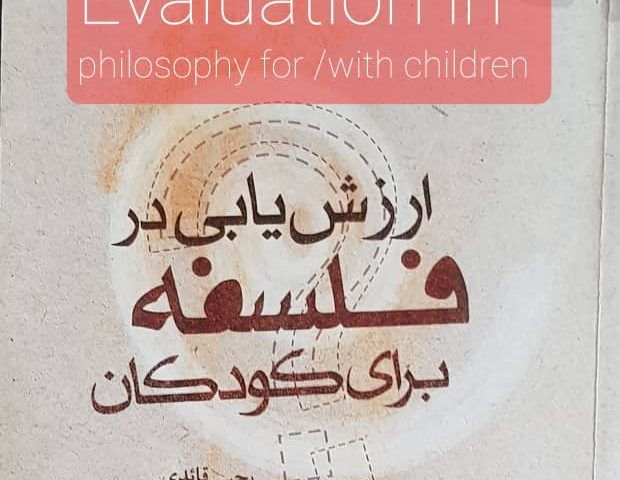- تماس بگیرید (ساعت ۱۰ تا ۱۶)
- ۰۹۰۲۱۹۹۷۳۳۸
- Iranp4c.kharazmi@gmail.com

The Adventures of Saina:Philosophy for Chidren Currciulum with Facilitaors Instrauctional Manual
سپتامبر 3, 2021
Molavi’s(Rumi) Masnavi and Philosophy for Children
سپتامبر 17, 2021
Evaluation in Philosophy for Children [In persian]
Yahya Ghaedi
Tehran: Institute for Humanities and Cultural Studies (First edition), 2015, p. 177
In the curriculum of philosophy for children, the traditional evaluation criticized in some cases, even if done correctly. Traditional evaluation is promotional, competitive, and information-oriented, but evaluation in philosophy for children is collective, non-competitive, and skill-oriented and even it is a way to help each other learn, improve, and develop it. The purpose of some critiques of philosophy for children and even the reason for emergence of such a curriculum is to counter the negative effects of traditional method, especially its evaluation. Philosophy for children believes that traditional evaluation blocks the process of thought and prevents acceptance of evaluation results. Evaluation in philosophy for children focuses on the collective dialogue.
Content
Note of Editor in chief
Introduction
Chapter 1: Definitions and Concepts of Evaluation and Evaluation of Philosophy for Children
۱٫ Evaluation
۱٫۱٫ An Overview of Definition of Evaluation
۲٫ Evaluation of Philosophy for Children
Endnote
Chapter 2: Philosophy of Evaluation and Philosophy of Evaluation of Philosophy for Children
۱٫ Philosophy of Evaluation
۱٫۱ Question about the Nature of Reality or Metaphysics and Educational Evaluation
۱٫۱٫۱ Ontology and Educational Evaluation
۱٫۱٫۲ Anthropology and Educational Evaluation
۱٫۲ What Is Epistemological Foundations of Educational Evaluation?
۱٫۲٫۱ Epistemology of Explicit Knowledge and Its Evaluation
۱٫۲٫۲ Epistemology of Implicit Knowledge and Its Evaluation
۱٫۳ Question about the Nature of Evaluation
۲٫ Philosophy of Evaluation in Philosophy for Children
Chapter 3: Evaluation Model of Philosophy for Children
۱٫ Evaluation System in Curriculum of Philosophy for Children
۲٫ Evaluation of Inputs of Philosophy for Children System
۳٫ Evaluation of Processes of Philosophy for Children System
۴٫ Evaluation of Outputs of Philosophy for Children System
۵٫ Evaluation of Feedbacks and Consequences of Philosophy for Children System
Endnotes
Chapter 4: Purposes and Types of Evaluation
۱٫ Purposes of Evaluation
۲٫ Purposes of Evaluation in Philosophy for Children
۲٫۱ Purposes of Evaluation Due to Time of Evaluation
۲٫۲ Purposes of Evaluation Due to Type of Evaluation
Chapter 5: Evaluation of Philosophy for Children Curriculum
۱٫ Evaluation of Curriculum
۱٫۱ Definition of Evaluation of Curriculum
۱٫۲ Purposes of Evaluation of Curriculum
۱٫۳ Models of Evaluation of Curriculum
۱٫۳٫۱ Evaluation of Product of Curriculum
۱٫۳٫۲ Evaluation of Curriculum
۲٫ Evaluation of Philosophy for Children Curriculum
۲٫۱ Evaluation of Entire Curriculum
۲٫۲ Evaluation of Part of Curriculum
Chapter 6: Evaluation of Processes in Form of Community of Inquiry
۱٫ Evaluation of Community of Inquiry Process in Instructor Training Workshop
۱٫۱ By Discuss and Dialogue
۱٫۲ By Descriptive Evaluation Sheet
۱٫۳ By Questionnaire
Chapter 7: Evaluation of Teacher
۱٫ Primary Evaluation of Teacher as Input of Philosophy for Children
۲٫ Levels of Evaluation of Teacher of Philosophy for Children
۳٫ Methods of Evaluation of Teacher
۳٫۱ Self-Evaluation
۳٫۱٫۱ Self-Evaluation of Teacher as Input of Philosophy for Children
۳٫۱٫۲ Self-Evaluation of Teacher During or After Implementing Philosophy for Children
۴٫ Evaluation by Students
۵٫ Evaluation by Close-ended Questionnaire
۶٫ Evaluation by Colleagues
Chapter 8: Evaluation of Students
۱٫ Methods of Evaluation of Students
۱٫۱ Individual Evaluation of Students
۱٫۲ Evaluation by Dialogue
۱٫۳ Evaluation by Questionnaire
۱٫۳٫۱ Types of Questionnaire
۱٫۴ Evaluation by Test
۱٫۴٫۱ New Jersey Test of Reasoning Skills (NJTRS)
References




